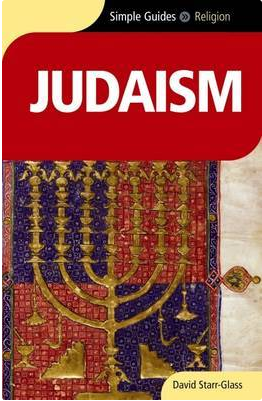
THIS BOOK WILL HELP YOU
• to appreciate the wisdom of the world’s oldest monotheistic religion
• to understand what it means to be a Jew
• to recognize the key Jewish festivals and the different aspects of Jewish practice and belief
• to avoid faux pas in conversation, in travelling and in personal relationships
Judaism is the world’s oldest monotheistic religion. While the number of its adherents has always been small, its principles and ethics have influenced Christianity and Islam, and its holy book, the Hebrew Bible, is arguably the foundation document of Western civilization.
The most important principle in Judaism is the belief in a single, ineffable Godhead, who created the universe and continues to govern it with justice and compassion. According to Jewish tradition, Judaism began with the covenant between God and Abraham, the patriarch and progenitor of the Jewish people. The central moment in their spiritual journey was the revelation of His laws to Moses on Mount Sinai, acceptance of which bound them to create a moral and ethical society that would be “a light unto nations”. Traditionally, Judaism places great value on study of the Torah and the observance of its commandments. It is, however, as much a religion of doing as of thinking, and Jews strive for a balance between thought and deed in carrying out the Divine task of “repairing” the world. In modern Judaism there is no earthly hierarchy: authority lies in its sacred texts, religious law, and learned rabbis who interpret those texts and laws for changing times.
Judaism is at once a subtle, practical, collective, and personal religion in which each believer enters into a direct relationship with God. This engaging book is not just a concise and readable introduction to its history, beliefs, teachings, and practices, but a shared exploration of the inner vitality and wisdom of the Jewish world.
ACCESS THE WORLD’S RELIGIONS
• to appreciate the wisdom of the world’s oldest monotheistic religion
• to understand what it means to be a Jew
• to recognize the key Jewish festivals and the different aspects of Jewish practice and belief
• to avoid faux pas in conversation, in travelling and in personal relationships
Judaism is the world’s oldest monotheistic religion. While the number of its adherents has always been small, its principles and ethics have influenced Christianity and Islam, and its holy book, the Hebrew Bible, is arguably the foundation document of Western civilization.
The most important principle in Judaism is the belief in a single, ineffable Godhead, who created the universe and continues to govern it with justice and compassion. According to Jewish tradition, Judaism began with the covenant between God and Abraham, the patriarch and progenitor of the Jewish people. The central moment in their spiritual journey was the revelation of His laws to Moses on Mount Sinai, acceptance of which bound them to create a moral and ethical society that would be “a light unto nations”. Traditionally, Judaism places great value on study of the Torah and the observance of its commandments. It is, however, as much a religion of doing as of thinking, and Jews strive for a balance between thought and deed in carrying out the Divine task of “repairing” the world. In modern Judaism there is no earthly hierarchy: authority lies in its sacred texts, religious law, and learned rabbis who interpret those texts and laws for changing times.
Judaism is at once a subtle, practical, collective, and personal religion in which each believer enters into a direct relationship with God. This engaging book is not just a concise and readable introduction to its history, beliefs, teachings, and practices, but a shared exploration of the inner vitality and wisdom of the Jewish world.
ACCESS THE WORLD’S RELIGIONS



